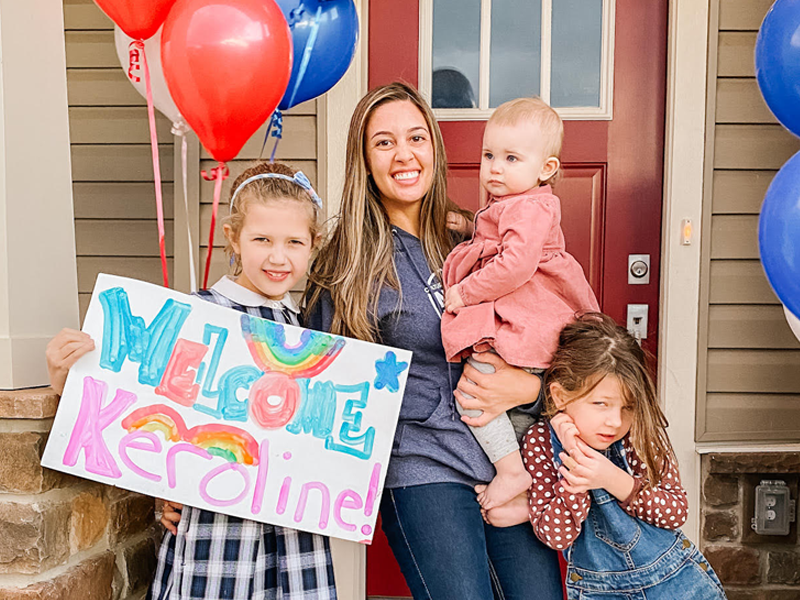Parents from our metropolitan area have many choices for in-home child care, such as extended family, mother’s helpers, babysitters and nannies. Our area’s emphasis on museums, the arts and international affairs, not only enrich our lives with culture but attract a variety of people to live here, including au pairs.
According to Cultural Care, a Boston-based au pair agency, “An au pair is a young adult from overseas who lives with your family on a legal visa for up to two years and provides child care in exchange for a weekly stipend, room and board and an opportunity to become part of an American family.” Amy Meier and her husband, from Frederick, became a first-time host family who hired an au pair to care for their children just as the pandemic began in March 2020.
Meier’s first experience with an au pair was so meaningful to the family and the au pair that it motivated the au pair to nominate the Meier family for a contest sponsored by Cultural Care. The Meier family became a top-15 finalist “Host Family of the Year” from thousands of applicants. Meier was eager to share with Washington Parent the many positive experiences she had with Keroline, their au pair from Brazil.
Already a mother of 6-, 4- and 1-year-old girls with twins on the way, Meier knew she needed extra help. With no family in the area, Meier researched au pairs as soon as she became pregnant. “We always loved the idea of an au pair. The cultural exchange is important. We knew we needed a third adult,” she explains. The most important research Meier did was to talk to local friends about their experiences with au pairs. Meier learned a lot just from talking to people and set to work filling out the application and submitting the fees to Cultural Care, the agency she chose.
Meier had the option to narrow down the countries from which the au pair would be traveling from and she chose Brazil. Keroline arrived in March and became instantly attached to the three girls, with the girls calling Keroline “Big Sister.” The Meier family set aside their entire furnished basement area to give Keroline a private living space, which included a private bathroom. Meier, her husband and Keroline worked as a unit to establish Keroline’s working hours each week, making sure that the schedule reached a maximum of 45 hours, including 1.5 days off each weekend, per her agency’s stipulations.
A busy mom with a flexible at-home work schedule in network marketing, Meier constantly juggled her schedule with her husband’s work schedule to make sure the three girls – and soon after, the five girls – received care. Meier stressed that her husband often took the older girls to do activities while she cared for the newborn twins. She said she chose an au pair to have the primary responsibility of taking care of their 1-year-old daughter.
According to both Cultural Care and Meier, families who choose au pairs all have different backgrounds and needs; some have one child, others have multiple children. Not every family needs the same type of help; families specify their requirements and work together with the au pair through open communications to ensure a smooth work experience and positive family interactions.
For Meier, the working relationship with Keroline turned into a loving atmosphere that would deeply affect the lives of everyone in the family. Meier says this happened organically due to the amount of time they spent together and the close bonds Keroline developed with the girls. Meier credits the initial interview during the au pair matching process as the time when she recognized Keroline’s intrinsic values.
“Keroline has a law degree. She was genuine and optimistic,” says Meier. As soon as Keroline arrived at the Meier household, Meier saw Keroline’s personality shine as she interacted with the girls and eased her way into becoming part of the family and not just hired help. Meier emphasizes that she chose Keroline because of her mindset and not her skill set, explaining that you can teach a person how to cook, but you can’t teach a person how to be happy and send out positive energy into the world.
Meier ended up paying $30,000 for a one-year commitment to have Keroline as her live-in au pair. “We gave her her own TV, couch and extras like Netflix [and] HBO, and buying the food she loves. Her happiness is so important to us. We wanted to make sure she was happy because she is family,” reasons Meier while admitting she paid an additional $10,000 more than what the agency required.
Though Meier asked Keroline to do a few administrative things, including doing the children’s laundry and, on occasion, preparing small meals, her main goal was to care for the 1-year-old, and when the twins arrived, to help out as needed. Meier discussed the importance of hiring an au pair who has a great attitude, is organized and can adapt to situations, which is exactly what was needed when the pandemic began in March 2020 and everything was shut down.
Though Keroline stayed with the Meier family for only one year, the bonding experience created a mutual feeling of admiration, respect and love which all parties say they want to maintain via long-distance communications.
Aimee Meier, her husband and their five daughters have recently begun their second one-year term with a new au pair from France. Meier enthusiastically recommends the services of an au pair, with her passion leading her to share her experiences on Instagram. Visit: instagram.com/meieraupairhostfam.


